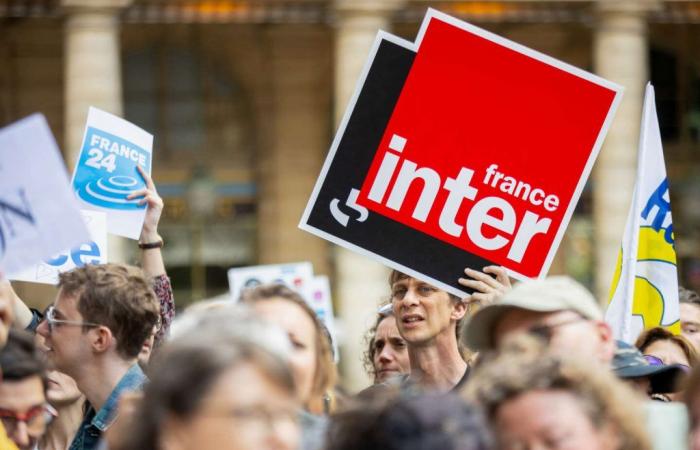
DSince the dissolution of June 9, employees of seven public radio stations (France Inter, -, France Bleu, France Culture, France Musique, FIP, Mouv’) and six television channels (France 2, France 3, France 4, Culturebox, France 5, FranceTVinfo) know that dark hours await them if the extreme right comes to power on July 7.
Follow our live: 2024 Legislative Elections: Among the 169 current withdrawals before the second round, a very strong majority of left-wing candidates
Add to your selections
The privatization of France Télévisions and Radio France (France Médias Monde and Arte would be spared, while the National Audiovisual Institute would join the National Archives) was already included in Marine Le Pen’s program for the 2022 presidential election. At the time, the National Rally (RN) candidate promised to “privatize public broadcasting to eliminate 138 euros of license fees”the amount then paid each year by French households owning a television – the most modest being exempt. Emmanuel Macron had also made this abolition a campaign promise.
It was held on the following 23rd of July, when the text confirming its disappearance was adopted in first reading in the National Assembly. Although brief, the debate was lively, and the 170 votes in favour (against 57, out of 577 deputies) were acquired when the Renaissance, MoDem, Horizons and Les Républicains groups had set up another system of financing independent of the State budget, unfortunately provisional: the allocation of a fraction of the VAT.
Read also (2022): The abolition of the audiovisual licence fee approved at first reading in the Assembly
Add to your selections
The RN could have been asked twice, as it wanted to go further. But it also brought its vote. A first step towards the weakening of public broadcasting had been taken.
When Rachida Dati undertook, upon her arrival at the Ministry of Culture in January, to “gathering forces” of public audiovisual media to centralize them within a single company, the RN has once again approved. “The holding company and the merger are going in the right direction”congratulated Philippe Ballard, deputy of Oise, responding to the Monde the 17th from
Read also | Public audiovisual: examination of the contested reform project postponed
Add to your selections
Mastodon in the cut
The ” good direction “ towards privatization? Certainly not. Even by blowing up all the existing anti-competitive barriers, French and European, a merger would result in a behemoth of more than 13,000 employees, for whom it would not be so easy to find a buyer – unless the latter did not care about profitability. Moreover, neither the outlines, nor the objectives, nor the legal, technical and even constitutional feasibility of a privatization seem to have been the subject of in-depth reflection at the RN, as demonstrated by the contradictory statements of its elected representatives. No more than the obligation imposed by the European Union on its Member States to defend their public audiovisual channels since the entry into force, on May 7, of the European Media Freedom Act, the regulation on freedom of the media which aims to protect the independence, freedom and pluralism of the media.
You have 50.1% of this article left to read. The rest is reserved for subscribers.





